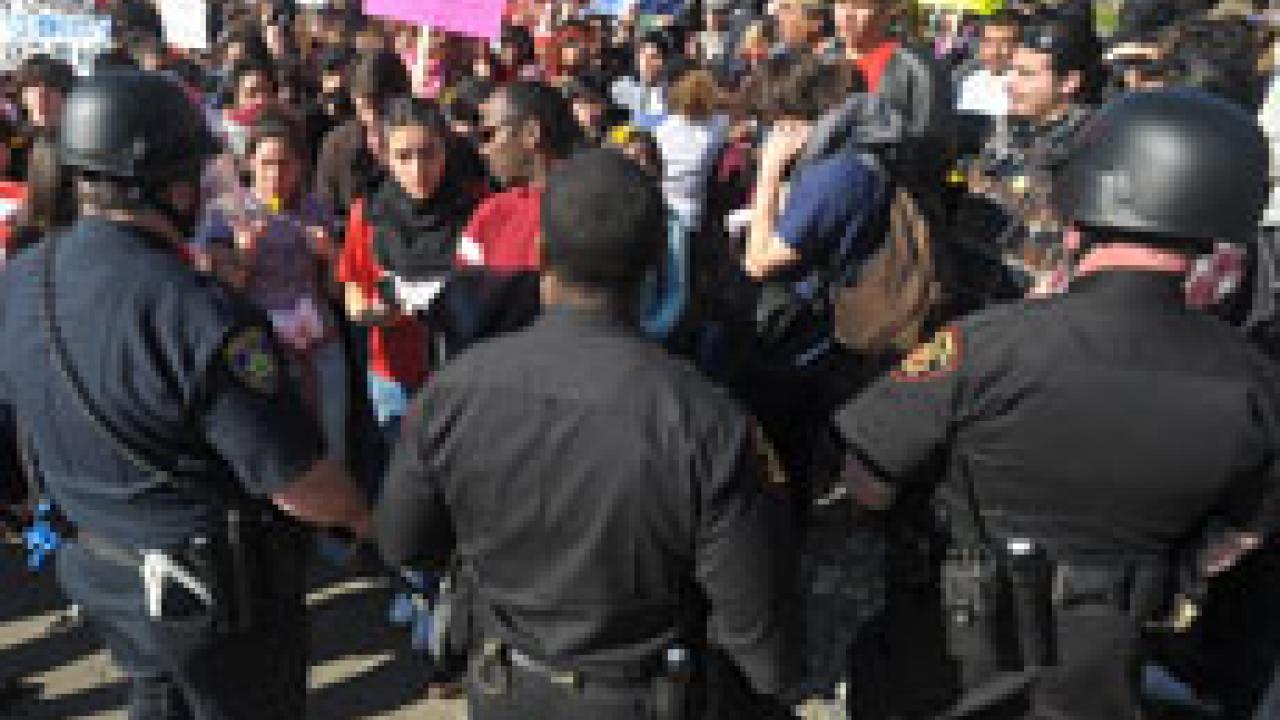Student leaders called for a “focus on safety” in the wake of student protests March 4 in which one student was arrested in a failed attempt to block traffic on Interstate 80.
ASUCD president Joe Chatham said he thought protesters went too far and cited the disruption of traffic and Unitrans buses and the pulling of fire alarms. President-elect Jack Zwald said, “Right now we have to focus on safety,” adding that student body leaders were in communication with campus police throughout March 4.
During the protests, more than 120 law enforcement officers were forced to use their batons and fire pepper balls to repel a crowd of some 300 protesters who were attempting to march onto Interstate 80 and block the busy freeway just before the onset of the afternoon commute.
Estimated costs for campus
This week, campus officials released estimated costs to handle the protests — $2,905 to respond to 19 false fire alarms; $10,065 for campus police; and $1,000 for the Emergency Operations Center. It cost off-campus police departments $55,065 to respond to the mutual aid call by UC Davis police — the university does not have to pay this expenditure. All of the estimated costs are described as very conservative.
‘March forth day’
Laura Mitchell, a sociology major from Stanford, was cited and released after her arrest for allegedly resisting arrest and inciting a riot. Smaller numbers of students protested into the evening, but no further arrests were made.
Despite the disruption, university sporting and entertainment events went on as planned.
The demonstration, part of a national “march forth” day of protest against soaring student fees and campus cuts, had been building from just before 9 a.m., when protesters began randomly pulling fire alarms around campus.
Shortly before noon, a crowd that had grown to perhaps 200 entered Olson Hall. They blocked the main hub of the student-run bus service, Unitrans, shutting down the service for about a half hour.
Marching from the MU to the bus station and along Russell Boulevard, students held posters that reflected their angst over budget issues and hate crimes. “Stop the Hate,” “Stand Up for Your Education,” “Queers Bash Back,” “Strike, Strike, Strike,” “Education is a Right” and “Education for Everyone.”
The California Highway Patrol joined with UC Davis police to draw a skirmish line at Old Davis Road, just north of the freeway, said Capt. Joyce Souza of the UC Davis Police Department.
“The crowd kept advancing,” Souza said. “They eventually confronted the officers after officers adjusted the skirmish line three times.”
Negotiations ended stalemate
Sheri Atkinson, director of the Lesbian, Gay, Bisexual, Transgender Resource Center, said early on in the day’s events, “A lot of people are affected by struggles in different ways.”
Atkinson helped police and students negotiate an end to the long showdown at the I-80 entrance, just off campus property where several rows of police in riot gear from counties as far away as Contra Costa were waiting. One of the officers told her, “They trust you,” and Atkinson expressed optimism that cooler heads would prevail after the lone arrest was made.
Before the freeway march, staff and faculty turned out for the noon rally at the Memorial Union.
“I’m very concerned with budget cuts and sympathize with the students, especially on the hate crimes and higher fees,” said Ward Stewart, director of the Student Academic Success Center, who has worned on campus for 29 years.
Mika Kubo, a first-year student from Berkeley, said it is “disgusting the way education is suffering.” Next year will be difficult figuring out how to pay for her education, Kubo said.
“I can’t afford to come here,” she said.
Susette Min, an assistant professor of Asian American Studies, showed up at the MU rally wearing a yellow arm band like many others to express solidarity with the students.
“I think public education must serve the public good,” said Min, who said she was impressed with the student activism.
“It will be a long fight,” she added.
It was a long day for campus firefighters, who in addiition to the 19 false alarms responded to five genuine alarms; two for people with chest pains, two for injuries sustained in bike accidents and one for a a malfunctioning dust detector in a lab.
Media Resources
Clifton B. Parker, Dateline, (530) 752-1932, cparker@ucdavis.edu
